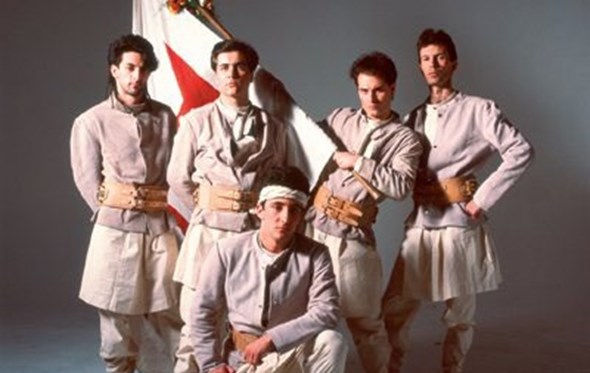Heróis do Mar were a Portuguese pop-rock band formed in March 1981 by Paulo Pedro Gonçalves (guitar), Carlos Maria Trindade (keys), Tozé Almeida (drums), Pedro Ayres Magalhães (bass) and Rui Pregal da Cunha (voice)
The band appeared in March 1981, in the Campo De Ourique area of Lisbon, formed by Pedro Ayres de Magalhães, Pedro Paulo Gonçalves and Carlos Maria Trindade, after the end of the group Corpo Diplomático at the end of the previous year. These musicians were joined by António José de Almeida (drummer of Tantra) and Rui Pregal da Cunha, who was just starting out in music. In fact, the future vocalist was the only member without any past with musical experience, as all the other elements either had musical training or had participated in previous projects.
The choice of the name «Heróis Do Mar», taken from the first verse of the Portuguese national anthem, A Portuguesa, was not a mere chance, as it was intended to represent Portugal, its history and its Greco-Roman art.
At a time when the memory of the Estado Novo was still very fresh, the band’s look, characterized by a nationalist and somewhat neo-militarist aesthetic, and song lyrics that reflected the glorification of a bygone Portugal, did not please many people. controversy ensued around the group, accused of an exacerbated nationalism, and even fascist and neo-Nazi.
In fact, members of the band even stated that they were banned from performing south of the Tagus River. At its genesis was the AXO movement, of which Pedro Ayres Magalhães was the leader, and which was connoted with the extreme right; another leader of the movement, Paulo Borges, came to compose the lyrics of two songs by the band: “Brava Dance of the Heroes” and “Raging Lovers”. Magalhães described AXO as follows: «the movement was a “surrealist construction” to “shock the bearded folk and ‘peace, bread and habitation’”, referring to a song by Sérgio Godinho. “Those controversial pamphlets are not meant to be taken literally. That is theatrical”.
In August 1981, the first single was released, containing the songs «Saudade» and «Brava Dança dos Heroes». The two themes appear on the debut LP, Heróis do Mar, released in October of the same year.
In June 1982, the song «Amor» was published, which had the participation of Né Ladeiras in the background vocals and which would become a great commercial success and platinum record, projecting the band for the first part of the concerts of King Crimson and of Roxy Music in Portugal in the summer of the same year, and for the performance in the first parts of Bryan Ferry’s band in France.
In 1983, the group released the album Mãe, which was well received by critics, but not so well received by the public. Meanwhile, the song also released in 1983, “Passion”, becomes a radio hit, leading the English music magazine The Face to consider the band as the best rock group in continental Europe.
The neo-militarist look gave way to a bolder look, less controversial, but still too bold for the time, with a lot of leather and ripped jeans.
The five musicians began to engage in solo projects, Pedro Ayres Magalhães took over the direction of the Fundação Atlântica publishing house, producing records by singer Né Ladeiras, Anamar and Delfins. Heróis Do Mar collaborated on the latest album by António Variações Dar E Receiver, in which Magalhães and Trindade were responsible for the production and arrangements.
The mini-LP entitled O Rapto, released in 1984, contained the theme «Só Gosto De Ti», which managed to have some success. In 1985 they released the single «Alegria» which resulted in a new radio hit. In 1985, rumors arose that Rui da Cunha might leave the group, which did not happen. In the meantime, they change to the publishing house EMI VC or Emi-Valentim de Carvalho.
In 1986, the album Macau was released, received with praise from the critics, which renewed the breath and vigor of the group. The following year they released the single and maxi-single O Inventor. The last album, Heróis Do Mar, was released in 1988 without the presence of drummer Tozé Almeida who had other plans for himself.
Later in 1989 they decide to separate due to internal conflicts. However, all the elements continued to dedicate themselves to music, with the exception of Tozé Almeida, who ended up dedicating himself to the production of television programs, advertising and some music videos.
The band’s history is revisited in the documentary Brava Dança by Jorge Pereirinha Pires and José Pinheiro. The documentary, says Blitz magazine, «also proposes a reflection on Portugal and the music of the post-25 April».
Currently, they are a key influence for some projects in the Portuguese music scene, of which the most prominent was the editorial project of Amor Fúria.






Wow, I didn’t expect this genre fusion! It’s so creative, and it keeps me on my toes the entire time
[…] the group’s breakup, they formed Heróis do Mar in September 1980. In 1982, the single “Princesa” was released by Vimúsica. The album […]
he is a true hero
Been long since I saw a post like this, I love it!